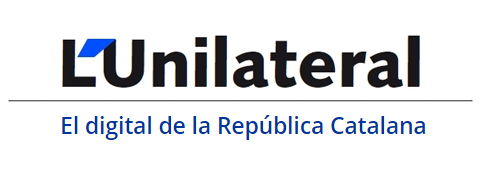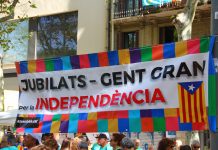Today there is a conflict situation between Catalan society and the Spanish State. And what causes it is a State praxis that corners our language and culture and limits or prevents Catalans from deciding on the governance of their own country. The Spanish state model is based on the control and plunder of the territory in order to perpetuate the institutional and human structures of the State itself and of the capital that articulates them: Madrid. The construction of the model began in 1714-1715 with the Bourbon victory and the structuring of a despotic monarchy that transmuted into an authoritarian nation-state in the middle of the 19th century. From 1714, power was in the hands of the Bourbons and their entourage: the army, the judiciary, the high officials, the economic oligarchies and the speculator bank.
And who exercises power now? Well, if it does or not, the usual ones. The monarchy is the keystone of a system that articulates high officials, the media, political leaders, the speculator bank that does not generate wealth; service companies controlled by the State; the large construction companies at the service of public works, as well as an uneven business that affects sectors with little added value. All these components usually coincide in the Santiago Bernabéu box office, which is the one who governs Spain deploying an imposing cross-cutting plot of corruption between the legislative, executive and judicial powers, and which protects and nurtures the powerful.
This model, however, has been working successfully for 300 years. However, there are cracks in it, given that the post-industrial revolution and the creation of the European market have taken center stage from the old nation-states which are becoming an anachronism and a danger to the development of the productive forces and the governance of the European Union.
In this context, the Spanish nation-state, like others, is entering a crisis, since it cannot adapt to the new logics that require powers to pass to Brussels and, at the same time, decentralize management to the regions to establish governance close to the people. The old Bourbon State, crippled by structural corruption, does not adapt to the new dynamics, and its cumbersome structure of inoperative administrations casts doubt on its future. An incompetent, non-competitive, inert and unproductive State, which survives thanks to debt and fiscal predation, has little chance of a future. However, he does not renounce the survival of the model, even if, as we are seeing, he is rehearsing the path of fascism.
Catalonia is facing this model. A country defeated in 1714 and crushed during the 19th and 20th centuries, occupied militarily in 1939 and subjugated again, by the violence of the State after the first of October 2017, when the Catalans were looking for a way out of the future on the basis to exercise democracy.
And why this permanent violence against the Catalans?
Catalonia, despite defeats and political subjugation, has been able to maintain its precious heritage of identity and develop a culture of work that has generated an important productive network that has become fundamental in the economic and social construction of southern Europe.
In recent years, the attacks of unionist parties against the weak autonomous powers achieved in 1978 multiplied as they were perceived as a potential threat against the Spanish state model. And the response of Catalan society, understanding that it was a problem of survival, was to claim political power, to be able to organize the deployment of the cultural heritage and promote the generation and use of wealth in the country. The chosen option, obviously, was independence, to build a modern state congruent with the needs of the new Europe, which would become a reference in terms of democratic culture.
On the other hand, the growth of an alternative in Catalonia implied a threat to the Spanish model of chess. And the confrontation of models also led to a clash in terms of city models. At the end of the day, the confrontation between Catalonia and Spain is also a struggle between two cities that are competing for the leadership of south-west Europe and that exhibit opposing models of the future. Madrid, a bureaucratic capital, with a productive model based on political management, the predation of the territory, banking speculation, the centralization of large companies and the services inherent in the maintenance of the State; it faces Barcelona, a dynamic and sustainable city, with a diversified and sufficiently competent economic fabric, which depends on itself, but which needs political power to survive and articulate Catalonia understood as an economic region. And it must be understood that, at the end of the day, the Catalan political revolution also aims to satisfy the urgent governance needs of the urban region that is actually structured by Barcelona.
We are, therefore, in a dynamic of multiple clash of models, which contenders consider with different strategies. The State practices what in game theory we would call a zero-sum game, given that a democratic victory in Catalonia would imply the collapse of the Spanish model.. Spain and Madrid, the capital, should be reinvented and rearranged and this is unthinkable and unacceptable in the logic of the Spanish elites. In this sense, the priority for the State is the liquidation of the concept of Catalonia, the destruction of its culture, the deactivation of its political inertia and the control of its economic resources.
On the contrary, an important part of Catalan politics, subsidiary to the regime of 1978, considers that a game of collaboration can be established with Spain that benefits both parties. And so, the strategic coordinates of Catalan politics have often been defined: to collaborate to make a more modern Spain, to which Catalonia can contribute in exchange for some privileges for the political class and some powers.
This option is infeasible, since a one-sided zero-sum game cannot be answered with a cooperative option. And this reality has been empirically demonstrated in the last two decades. The Spanish State will never negotiate significant freedoms for Catalonia for the simple reason that its model is based precisely on the political submission of the Catalans.
Everyone knows how this confrontation has evolved, and how the Catalan attempts to advance on a democratic path ended in the harsh day of the first of October and its epilogues of savage repression.
And let no one doubt it, the unionist political forces will maintain, to the extreme, the defense of the model given that their lives depend on it.
Otherwise, why should they negotiate?
What need do they have when they know they can use justice to repress relentlessly? When they know that, when the time comes, they will use fascist gangs, police forces and the army to frighten people. When they see that the application of the Milosevic doctrine is being tolerated by Germany and France. When they imprisoned political and civic leaders and the Catalan political and trade union forces did not articulate any effective response. When Europe tolerates the existence of political prisoners in Spain. When they have a formidable media machinery that can guide people’s everyday imagination. When they think they can consolidate a Spanish colonial population in Catalonia that will serve to slander the Catalans.
What need do they have to negotiate when they have a powerful collaborationist network led by La Caixa, Foment del Treball or Grup Godó and which also caters to political parties and trade unions.
For decades, the political environments of this country have struggled to articulate a single town that was being built in accordance with the Catalan core, but integrating the most diverse contributions. Now, the PP and Ciudadanos want to fracture the people and consolidate two societies, the Spanish-colonial and the Catalan, and they think they can use the Spaniards living in Catalonia as a battering ram against the Catalans. And the State plays this card thoroughly, and it does so with the conviction that time plays in its favor. At the end of the day, Catalonia has problems, it is the country with the most immigration in the world, it has a very high unemployment rate and a very low birth rate. All in all, they think that if they hold out for a few years, the Catalan problem will be deactivated by itself. And obviously the State will help the dissolution of Catalan identity, and they have significant experience given that cultural genocide has been successfully experienced in the Valencian Country and the Islands for years.
There will be no negotiation given that the State is sure of its victory, either with violence or with promises of dialogue. And the fanciful negotiation bubble must be punctured once and for all. Some autonomist forces still maintain the magical thinking that independence will be achieved by negotiating with the Spanish State, and that will not happen.
However, independence is the only option for the Catalans. The alternative is extinction and that is no alternative. And in the process there are no magic solutions. The road to freedom is laid out, and it was marked by the people of this country with courage, on the first of October.
And where does the road to independence go? Well, for the intelligent sum of actions and initiatives that generate pressure that opens new windows and opportunities for rupture or negotiation.
It is necessary to maintain the permanent mobilization, the revolutionary gymnastics, it is essential to pave the way, and in this context the struggle to free the prisoners and achieve the return of the exiles is essential.
It is necessary to strengthen foreign action by gaining influence in Europe. At the same time, Catalonia must be at the forefront of building a new Europe based on the governance of the regions.
Efforts must be redoubled for the defense and expansion of our language and culture by strengthening our identity components, with the support of the administration and competing in the market. The cultural battle is decisive.
Scientific, university, research, artistic and cultural institutions need to define themselves and align themselves with the cause of democracy and national building. We must be competent in research and science to be stronger. We need to incorporate historical rights into our claims, as the Scots did with the spirit of Devolution. We are not asking for a new state, we want the restitution of our state based on the Constitutions of 1706. There is no future without the vindication of the past.
It is necessary to fortify civil society, the real protagonist of change, and turn it into the locomotive of democratic breakdown.
It is necessary that the economic and social, business, entrepreneurship and trade union forces, objectively interested in a new state framework, multiply their commitment to independence.
It is necessary to eradicate the autonomist culture, heir to the post-Franco regime, which stifles the political praxis of the parties at home.
We need to avoid the politics of Madrid and open our own arenas, the important fact is not what happens in the Congress of Deputies, but what is done in Catalonia.
It is necessary for the autonomous institutions, the deputations, the county councils and the town halls to multiply their effectiveness by promoting, to the extreme, policies of social justice.
It is necessary to ensure a massive presence of independence in the town halls to turn them into a bulwark in defense of the land.
Barcelona must win for independence. The world cannot understand that Catalonia makes a revolution to satisfy the interests of Barcelona, and that the City Council defends a unionist status quo that enshrines the minoritization of the city. We must tear Barcelona from the tutelage of unionism and make it join and lead the cause of freedom.
It is possible to join forces to win any election. What the polls dictate is, in the end, what is decisive.
And with all this we must strengthen our options in order to face the future and we must not rule out any possibility to force a democratic break with or without negotiation.
Friends, nothing will be easy… but it depends on us. We can and we will. At this historical moment, the struggle for independence is the object and subject of history… it is the really important fact. Here, below us, in this grave, are the remains of the people who died defending the rights of the nation conquered and treasured for centuries and revealed in our Constitutions. We are also heirs of the fighters of 1714; of the Reapers of 1640; of the Little Angels of the Earth, of the Caps and the Barretines; of the Remences of the XV century; of the Jamancia revolts; of the Republicans of 1873; of the mutineers of the Tragic week; from the trade unionists of La Canadenca; of the soldiers of the Battle of the Ebro; of the anti-Francoists and above all… above all, we are the fighters of the first of October. The first of October, our epic epic, marks our path. Onward for victory. Today, from here, at the foot of Santa Maria del Mar, the place where the indomitable spirit of our nation was forged, today, from here we must reaffirm our commitment to freedom.
Honor and glory to the heroes of 1714 and to the heroes of the first of October. Honor and glory to King Charles III and Queen Elizabeth; long life to President Puigdemont; long life to President Torra and long life to the Catalan Republic.
–> link: https://unilateral.cat/2018/09/11/lu-doctubre-de-2017-una-visio-historica-actual/









![[JUDICI CÚPULA MOSSOS] Manefleries contra Pere Soler i Cèsar Puig Lluís Busquets](https://unilateral.cat/wp-content/uploads/2017/10/DSC_0456-1-218x150.jpg)



